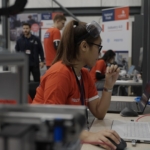The UK Cabinet’s recent endorsement of an independent report on European migration is an important marker for the post-Brexit future of skills. The Migration Advisory Committee’s (MAC’s) report’s key recommendation is that after Brexit, citizens of EU countries should not have the same access to the UK as they do today. One estimate suggests that if the MAC report’s recommendations are put into place, 75% of EU nationals currently working in the UK would no longer be able to do so. This would represent a major shift in our understanding of how the UK economy meets its skills needs. For the past 15 years in particular, the UK has relied on hundreds of thousands of EU nationals to fill key vacancies, particularly in areas such as hospitality and construction.
Business concerns about the MAC report conclusions on restrictions to skilled migrant labour are well founded and they shouldn’t be dismissed, but the MAC report is potentially heralding the dawn of a new post-Brexit reality to which we will need to adapt. Come January 2021, business as usual is going to cease so we should spend our time preparing for change and getting ourselves in the “Team UK mindset”.
That means drawing on the key lessons we have learned from Team UK, most recently competing at EuroSkills Budapest this past week. The UK is going to have to do more to develop our home-grown talent and drive skills standards ever higher to create the productive and competitive economy that we all want to see for the long-term. At the EuroSkills competition, in which 28 countries were battling it out for medals, it is clear that all our major rivals are investing more in skills development. While Team UK did us all proud finishing in ninth place in the medal tables – in skill areas covering engineering, construction, hospitality and services – Russia, Austria, France and Germany demonstrated their prowess at the very top of the medal table that comes from increasing investment.
So we have to view the potential lower levels of EU migration as an opportunity to up our own game. Skills competitions are a key way of tracking success and determining just how ‘Brexit ready’ our economy currently is. Next year, Team UK we will be at the ‘Skills Olympics’ in Russia, at EuroSkills in Austria in 2020 and then in Shanghai for the global event in 2021. Regularly testing of our world-class credentials against competitors in Europe and on the global stage, against the likes of China and Korea, will ensure we are learning from the best and bringing back these insights to embed in our skills systems to boost productivity. For businesses, skills competition activity can be the perfect complement to apprenticeships and technical training, accelerating the development of higher standards at work. The apprenticeship levy already allows employers to fund competition participation and future potential changes could release more funds to boost training investment further.
So let’s see the MAC report not as a threat, but as an important signpost to the future direction our economy is going to have to take, blending restricted migrant labour alongside a new generation of home-grown high flyers, equipped with the skills the economy needs to to help attract inward investment to create and maintain jobs. It’s going to need all of us – governments, business and education – to pull in the same direction. That’s what Team UK were doing in Budapest last week – and we can all learn from this medal-winning approach.


